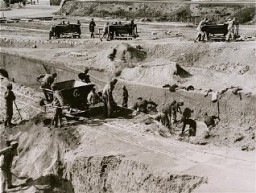You searched for: 点赞分享赚钱系统定制开发【TG���������@EK7676】平台包网搭建点赞分享赚钱系统定制开发【TG���������@EK7676】平台包网搭建45lYiA56c7
<< Previous | Displaying results 111-120 of 136 for "点赞分享赚钱系统定制开发【TG���������@EK7676】平台包网搭建点赞分享赚钱系统定制开发【TG���������@EK7676】平台包网搭建45lYiA56c7" | Next >>
-
Bernard Krakauer
ID CardBernard was one of seven children born to a German-speaking, Jewish family in the small Moravian town of Mikulov in the central part of Czechoslovakia. The family later moved to the town of Hodonin where Bernard opened a dry-goods and clothing store. In 1899 he married Berta Koselova, and the couple had six children. During World War I Bernard served in the Austro-Hungarian army. 1933-39: In 1938 Bernard retired, and since none of his sons wanted to take over the business, Bernard sold it. He, his wife,…
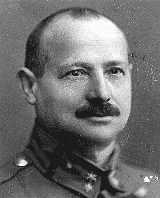
-
Berta Koselova Krakauerova
ID CardBerta was born to a Jewish family. Orphaned when she was a child, she was raised by her Uncle Poldi in Vienna. In 1899 she married Bernard Krakauer, a Jewish businessman from her hometown of Mikulov. As was the custom for orphans, Berta wore a black dress at her wedding. The couple settled in the town of Hodonin, where Bernard opened a dry goods and clothing store. They raised six children. 1933-39: With their children grown, Berta's husband retired in 1938. He sold the business and moved with Berta and…
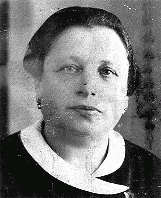
-
Felix Krakauer
ID CardFelix was one of six children born to Jewish parents in a small Moravian town, where his father ran a dry goods and clothing store. The family spoke Czech and German at home and Felix attended German-language schools. As a youth, he belonged to a Zionist club and liked to ski. He graduated from an international trade school in Vienna before settling down in the Moravian capital of Brno. 1933-39: During the 1930s Felix married a Christian woman from the town of Hodonin. When Felix's father retired in 1938,…
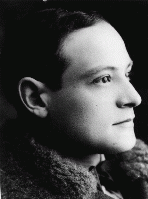
-
Robert Skutecky
ID CardRobert was the second of three children born to Jewish parents in the Moravian capital of Brno, where his father ran a shipping company. Between 1909 and 1920 Robert lived with his widowed grandmother, who resided nearby. He completed secondary school in 1922, and then attended an international trade school in Vienna. Robert earned a doctorate in law from Charles University in Prague in 1930. 1933-39: After apprenticing as a lawyer for five years, Robert finally opened his own practice in Brno in January…

-
Jocheved Kuzda Kasher
ID CardJocheved, or Jadza as she was called at home, was born in the industrial city of Lodz, Poland's second-largest city. Before the war, one-third of Lodz's inhabitants were Jewish. The Kuzdas kept a traditional Jewish home and placed importance on their children's education. Jocheved had two older sisters, Sarah and Regina. 1933-39: Jocheved was 9 when the war broke out in September 1939. Instead of starting school, she stayed at home listening to the bombs exploding. Her father and sister tried to get to…
-
Steven Springfield describes 1945 death march from Burggraben in the Stutthof camp system
Oral HistoryThe Germans occupied Riga in 1941, and confined the Jews to a ghetto. In late 1941, at least 25,000 Jews from the ghetto were massacred at the Rumbula forest. Steven and his brother were sent to a small ghetto for able-bodied men. In 1943 Steven was deported to the Kaiserwald camp and sent to a nearby work camp. In 1944 he was transferred to Stutthof and forced to work in a shipbuilding firm. In 1945, Steven and his brother survived a death march and were liberated by Soviet forces.
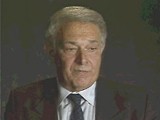
-
Joseph Stanley Wardzala describes conditions at the forced-labor camp in Hannover
Oral HistoryJoseph and his family were Roman Catholics. After Germany invaded Poland in 1939, roundups of Poles for forced labor in Germany began. Joseph escaped arrest twice but the third time, in 1941, he was deported to a forced-labor camp in Hannover, Germany. For over four years he was forced to work on the construction of concrete air raid shelters. Upon liberation by US forces in 1945, the forced-labor camp was transformed into a displaced persons camp. Joseph stayed there until he got a visa to enter the…
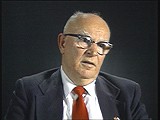
-
William Denson describes postwar trials of concentration camp personnel
Oral HistoryWilliam Denson graduated from the US Military Academy at West Point in 1934 and attended Harvard Law School. He returned to West Point to teach law from 1942 until 1945. In January 1945, Denson accepted the position of Judge Advocate General (JAG) in Europe and was assigned to US Third Army headquarters in Germany. He took part in more than 90 trials against Germans who had committed atrocities against downed American pilots. In August 1945, Denson became chief prosecutor for the US government at the…
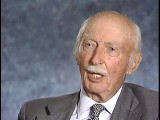
-
Theresienstadt: Concentration/Transit Camp for German and Austrian Jews
ArticleLearn about the role of Theresienstadt in the deportation of German and Austrian Jews to killing sites and killing centers in the east.
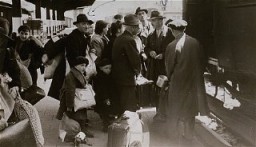
-
Mauthausen
ArticleThe Mauthausen concentration camp was established following the Nazi incorporation of Austria in 1938. Learn about the harsh conditions in the camp.
